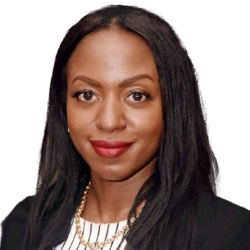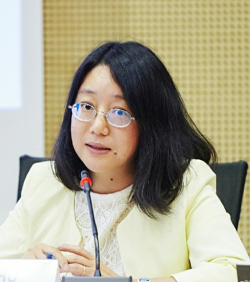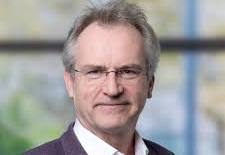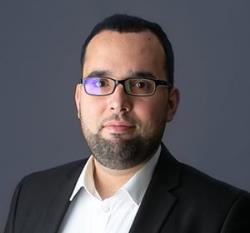Pioneering Responsible Global Governance for Quantum Technologies
European University Institute, Sciences Po, United Nations Educational, Scientific and Cultural Organization
Session 164
An open call to discuss the Information for All Programme (IFAP) Policy Brief
This session on “Pioneering Responsible Global Governance for Quantum Technologies,” coordinated by the EUI, Sciences Po, and UNESCO, is part of a collaborative initiative with Quantum Delta NL.
In the first segment of the collaborative initiative, this session will explore the growing need for responsible global governance of current and anticipated governance of quantum technologies (QT). Despite their current limited practical applications, QT pose challenges due to their potentially disruptive nature in a wide range of applications which raises sociotechnical concerns related to safety, structural inequality, and the broader uneven impact of technological transitions on our global interdependent society. Responsible global governance is essential to navigate the complexities of the emerging QT Economy and to establish inclusive frameworks that support meaningful international cooperation, equitable distribution of technological benefits, and access to (digital) public goods.
Panellists will include experts from the coordinating organisations, the Geneva Science and Diplomacy Anticipator (GESDA), and Quantum Delta NL.
As part of the session, the draft policy brief on “Advancing Information for All through Responsible Global Governance of Quantum Technologies" will be presented and key takeaways from the brief will be discussed by the panellists.
The second part of the collaboration initiative organised by Quantum Delta NL will feature a roundtable event on “Shaping Inclusive Global Action Towards the Governance of Quantum Technologies,” further emphasizing the need for interdisciplinary and collaborative efforts in this crucial area. Both sessions aim to gather input from the WSIS+20 community.

Shamira Ahmed is a Policy Leader Fellow at the European University Institute's Florence School of Transnational Governance, her research interests include sustainable digital transformation, international digital development, intersectional inequalities and technological change, ethical innovation, and responsible global governance in the digital age.
Shamira is the founder and executive director of the Data Economy Policy Hub (DepHUB), the first independent think tank founded by an indigenous African woman in South Africa. She is also the founder of Artificial Intelligence for Circularity Exchange (AI4CE), a platform created to promote diverse perspectives for an AI-led just green-digital "twin transition" to support the circular economy model (CEM), in sub-Saharan Africa (SSA).
Shamira is an active member of various global working groups such as the Institute of Electrical and Electronics Engineers (IEEE) Planet Positive 2030, United Nation’s Internet Governance Forum (UNIGF) Policy Network on Artificial Intelligence (PNAI), Partnership on AI’s (PAI) Demographic Data and Algorithmic Fairness, and United Nations Conference on Trade and Development’s (UNCTAD) Measuring E-commerce and Digital Economy Statistics, to name a few.
Shamira's participation as a founding partner of the South African AI Association (SAAIA) and global chair of the Digital for Development (D4D) Hub Civil Society & Academia Advisory Group (CSAAG), stands as a testament to her commitment to advancing inclusive transnational policy discourse in the digital age. Shamira is committed to addressing pressing global challenges through interdisciplinary approaches, with a background as a policy entrepreneur and quantitative economist, she has led numerous policy-oriented research projects and contributed significantly to public interest publications such as the African Union Commission's "Data Policy Framework" and the Global Partnership on AI's Report "Towards Real Diversity and Gender Equality in Artificial Intelligence", to name a few.
-p-2000.jpg?maxwidth=250)
Pierre Noro is an expert in decentralized governance and blockchain-based social innovation.Over the past 7 years, he has worked with the Caisse des Dépôts, France's main public finance institution, and with several European startups, designing and building pioneering impact-driven blockchain projects in sensitive sectors such as green finance, digital identity, education, journalism, and voting. Pierre is also a researcher working at the intersection of blockchain technologies, digital ethics, and decentralized governance. He is a lecturer at SciencesPo Paris and Université Paris-Cité.Since January, he has joined Frequency as the Ecosystem Manager of the first Polkadot parachain engineered to unlock decentralized social networking at scale.

Dr. Xianhong Hu is UNESCO’s Programme Specialist at the Sector of Communication and Information. She joined UNESCO through its competitive Young Professionals Program in 2006. She serves on the Secretariat of UNESCO’s Intergovernmental Program of Information for All (IFAP) since 2021 and had led UNESCO project of Internet Universality R.O.A.M principles (Rights, Openness, Accessibility, Multi-stakeholder) indicators during 2013-2021.
She has followed the UN led processes of the World Summit of the Information Society (WSIS) and Internet Governance Forum (IGF) since 2006. Her policy work relates to humanistic digital governance and transformation, the ethical implications of Artificial Intelligence and other emerging technologies and building humanistic and inclusive Knowledge Societies.
She observed the IGF Multistakeholder Advisory Group (MAG) and Missions Publiques. She serves on the Steering Committee of member of European Dialogue of Internet Governance (Eurodig) and the International Conference on Theory and Practice of Electronic Governance (ICEGOV).
She received a Ph.D from School of Journalism and Communication at Peking University in China in 2007 and was an affiliate of Harvard University Berkman Klein Center for Internet and Society (2021-2022). She is an alumni in the professional area of Internet governance of the International Visitor Leadership Program (IVLP) as invited by the U.S Department of State in 2016.
She authored +20 publications and articles and recently lead-authored UNESCO policy study Steering AI and Advanced ICTs for Knowledge Societies: A ROAM Perspective’(2019).
She gave guest lectures in a number of Universities including Science Po, Bordeaux University Montagne, University of Malta, the Chinese University of Hong Kong, Macao University, Peking University, China Communication University, etc.
She initiated UNESCO Series Publication on Internet Freedom in 2011, which has captured the complex dynamics of global Internet governance by studying policy issues of online freedom of expression, privacy, Internet intermediaries, digital safety, Artificial Intelligence, etc. She has conducted UNESCO Series Publication on investigative journalism including “Story-Based Enquiry: A Training Manual for Investigative Journalism” and “Global Casebook of Investigative Journalism”.

Ms Hood holds a Master’s degree in management from EMLyon business school and a Master’s degree in urban planning and development from University Paris 1 Panthéon-Sorbonne. She began her career in strategy consulting, where she advised local, regional and national governments on economic and innovation policy. She has a specific interest in assessing the methods and mechanisms that policymakers use to accelerate economic development in their regions, such as innovation clusters, incubators, accelerators and technology transfer platforms. In 2012, Ms Hood joined the Swiss Department of Foreign Affairs at the Embassy of Switzerland, first in Paris and then as the head of business section of the Embassy of Switzerland in the UK. In this role she supported business and R&D ventures, working with start-ups on AIand data-driven technology projects, with applications in healthcare, life science and performance engineering. In August 2020 she joined GESDA, where she oversees the do-tank activities of the Foundation. In this capacity, she recently led the incubation of the Open Quantum Institute, born at GESDA and hosted since March 2024 at CERN, with the support of UBS. This novel multilateral science diplomacy initiative aims at leveraging the power of quantum computing for the benefit of all.

Pieter Vermaas is philosopher of quantum technology and design at TU Delft. He leads ethics research for the Dutch Quantum Delta NL programme for the development of quantum technologies and heads the Quantum Lab at the Faculty of Technology, Policy and Management of TU Delft. His research concerns the societal and moral impact of quantum computing, quantum internet and quantum sensing, and the use of design tools for enabling non-expert stakeholders to co-shape these technologies.
Vermaas has a training in physics and philosophy at the University of Amsterdam and obtained his PhD on the foundations of quantum mechanics at the Institute for History and Foundations of Science of Utrecht University. At TU Delft he helped creating the Dual Nature of Technical Artifacts research program (2000-2005), in which technical artefacts were conceptually and ontologically analysed as having both structural and intentional natures, with functions playing an important role in relating these natures. From 2006 to 2010 he obtained a five-year NWO VIDI fellowship for epistemological research on the use of functions and functional decompositions in engineering design methods. Research thereafter broadened to the methodology of product design and design thinking, including the Delft “design for values” approach to the realisation or safeguarding of moral and societal values in technology through design.
Vermaas is Editor in Chief of the book series Philosophy of Engineering and Technology and edited handbooks on Design for Values and Engineering Systems Design. He co-launched the Delft Design for Values Institute and served as president of the Society for Philosophy and Technology (SPT)

Neil Abroug coordinates the French national quantum strategy having a 1.8 Billion EUR investment portfolio. He began his career as a research engineer and project manager at CEA in the field of Industry 4.0. In 2018, he joined the Directorate General for Enterprises at the French Ministry of Economic Affairs where he contributed to setting up the national quantum agenda. In particular, he was the rapporteur of the parliamentary report “Quantum: the technological shift that France will not miss”. Neil is a Dr. Engineer in applied mathematics. He also graduated in Innovation Management and Competitive Intelligence.
-
 C1. The role of governments and all stakeholders in the promotion of ICTs for development
C1. The role of governments and all stakeholders in the promotion of ICTs for development
-
 C3. Access to information and knowledge
C3. Access to information and knowledge
-
 C6. Enabling environment
C6. Enabling environment
-
 C10. Ethical dimensions of the Information Society
C10. Ethical dimensions of the Information Society
-
 C11. International and regional cooperation
C11. International and regional cooperation
-
 Goal 1: End poverty in all its forms everywhere
Goal 1: End poverty in all its forms everywhere
-
 Goal 8: Promote inclusive and sustainable economic growth, employment and decent work for all
Goal 8: Promote inclusive and sustainable economic growth, employment and decent work for all
-
 Goal 9: Build resilient infrastructure, promote sustainable industrialization and foster innovation
Goal 9: Build resilient infrastructure, promote sustainable industrialization and foster innovation
-
 Goal 10: Reduce inequality within and among countries
Goal 10: Reduce inequality within and among countries
-
 Goal 17: Revitalize the global partnership for sustainable development
Goal 17: Revitalize the global partnership for sustainable development